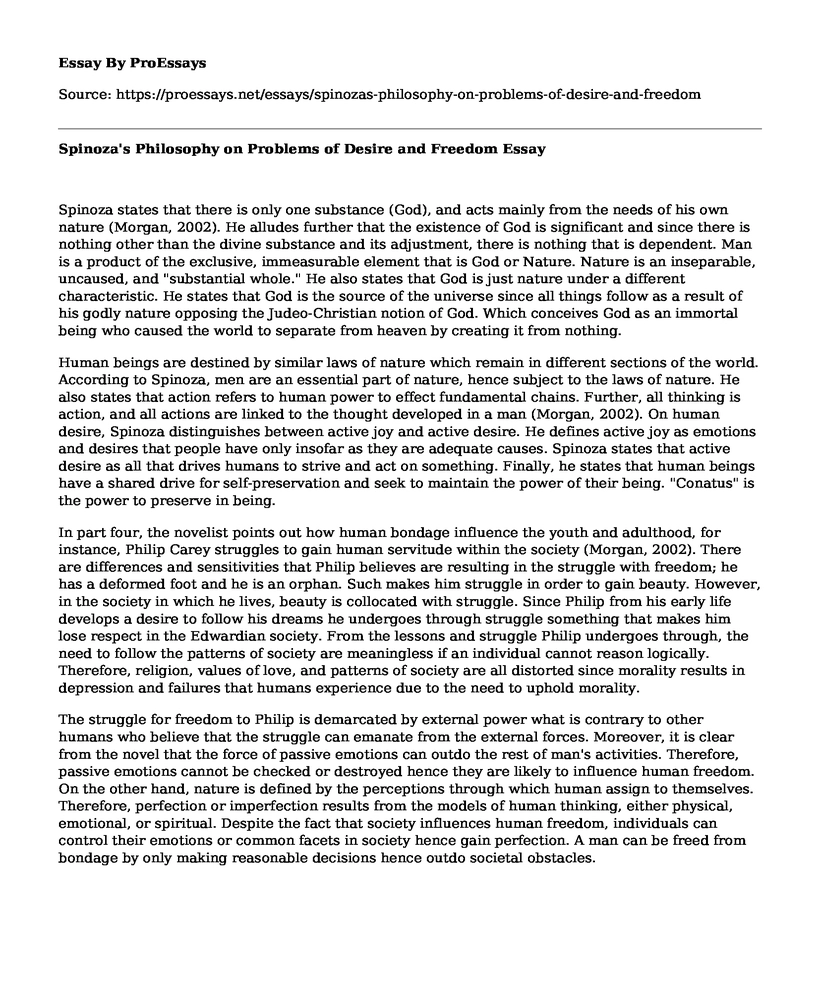Spinoza states that there is only one substance (God), and acts mainly from the needs of his own nature (Morgan, 2002). He alludes further that the existence of God is significant and since there is nothing other than the divine substance and its adjustment, there is nothing that is dependent. Man is a product of the exclusive, immeasurable element that is God or Nature. Nature is an inseparable, uncaused, and "substantial whole." He also states that God is just nature under a different characteristic. He states that God is the source of the universe since all things follow as a result of his godly nature opposing the Judeo-Christian notion of God. Which conceives God as an immortal being who caused the world to separate from heaven by creating it from nothing.
Human beings are destined by similar laws of nature which remain in different sections of the world. According to Spinoza, men are an essential part of nature, hence subject to the laws of nature. He also states that action refers to human power to effect fundamental chains. Further, all thinking is action, and all actions are linked to the thought developed in a man (Morgan, 2002). On human desire, Spinoza distinguishes between active joy and active desire. He defines active joy as emotions and desires that people have only insofar as they are adequate causes. Spinoza states that active desire as all that drives humans to strive and act on something. Finally, he states that human beings have a shared drive for self-preservation and seek to maintain the power of their being. "Conatus" is the power to preserve in being.
In part four, the novelist points out how human bondage influence the youth and adulthood, for instance, Philip Carey struggles to gain human servitude within the society (Morgan, 2002). There are differences and sensitivities that Philip believes are resulting in the struggle with freedom; he has a deformed foot and he is an orphan. Such makes him struggle in order to gain beauty. However, in the society in which he lives, beauty is collocated with struggle. Since Philip from his early life develops a desire to follow his dreams he undergoes through struggle something that makes him lose respect in the Edwardian society. From the lessons and struggle Philip undergoes through, the need to follow the patterns of society are meaningless if an individual cannot reason logically. Therefore, religion, values of love, and patterns of society are all distorted since morality results in depression and failures that humans experience due to the need to uphold morality.
The struggle for freedom to Philip is demarcated by external power what is contrary to other humans who believe that the struggle can emanate from the external forces. Moreover, it is clear from the novel that the force of passive emotions can outdo the rest of man's activities. Therefore, passive emotions cannot be checked or destroyed hence they are likely to influence human freedom. On the other hand, nature is defined by the perceptions through which human assign to themselves. Therefore, perfection or imperfection results from the models of human thinking, either physical, emotional, or spiritual. Despite the fact that society influences human freedom, individuals can control their emotions or common facets in society hence gain perfection. A man can be freed from bondage by only making reasonable decisions hence outdo societal obstacles.
References
Morgan, M. L. (2002). Spinoza: Complete Works.
Cite this page
Spinoza's Philosophy on Problems of Desire and Freedom. (2022, Mar 24). Retrieved from https://proessays.net/essays/spinozas-philosophy-on-problems-of-desire-and-freedom
If you are the original author of this essay and no longer wish to have it published on the ProEssays website, please click below to request its removal:
- Ethics in Social Work Essay Example
- Marriage Traditions in Islam and Christianity Essay
- Essay Example on Promise-Keeping: Morally Crucial for Trust, Security and Character
- Is Buddhism a Religion or a Philosophy?
- Paper Example on Plato: A Student of Socrates & Teacher of Aristotle
- Essay Example on Exploring Social Identity Through Media Messages
- Essay Example on Buddhism: A Religion of Unity, Not Difference







